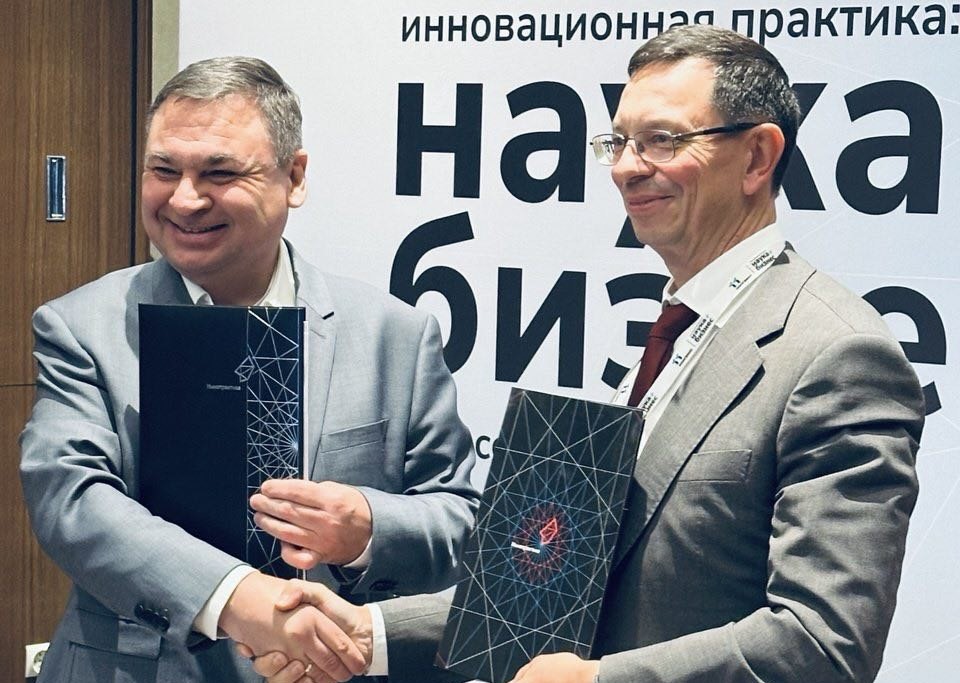HSE and Integration Education Centre to Develop New Programmes for Agrobiotech Advancement

HSE University and ANO Integration plan to jointly develop projects aimed at creating new approaches to education and advancing innovative agrobiotechnologies. The parties signed the corresponding agreement at the XI Congress ‘Innovative Practice: Science Plus Business.’
One area of collaboration between HSE and ANO Integration (Autonomous Non-profit Organisation ‘Integration Education Development Centre’) will focus on advancing agricultural education. The parties intend to develop and customise master's programmes in genetics and breeding while working on establishing a unified pre-university agricultural education system to address the workforce crisis in the agricultural sector and ensure sustainable rural development.
Additionally, the organisations agreed to support agricultural universities participating in the Ministry of Science and Higher Education of Russia's ‘Priority 2030’ and ‘Advanced Engineering Schools’ programmes. These universities will prepare strategic projects aimed at creating critical technologies for the agricultural sector. The projects include developing new genetic technologies, biologising plant and animal production, and introducing digital solutions for agriculture.

‘Given the importance of innovation and technology for the agricultural sector, our university has long set goals to expand research activities in this field and to train modern professionals for the domestic agricultural sector at a fundamentally new level, with qualifications at the intersection of various technologies. We hope that the combination of HSE's scientific expertise, advanced educational standards, and achievements in innovative technologies with the experience of our colleagues at Integration in reforming agricultural education will help us create conditions for our agriculture to successfully respond to the challenges of the new era,’ said HSE Rector Nikita Anisimov.
‘HSE University possesses exceptional research and educational competencies that are now reaching the agricultural sector. Our collaboration aims to train specialists for the agricultural sector and develop innovative agrotechnologies capable of replacing foreign solutions and strengthening Russia's food security,’ commented Vladimir Avdeenko, General Director of ANO Integration.
See also:
HSE Scientists Optimise Training of Generative Flow Networks
Researchers at the HSE Faculty of Computer Science have optimised the training method for generative flow neural networks to handle unstructured tasks, which could make the search for new drugs more efficient. The results of their work were presented at ICLR 2025, one of the world’s leading conferences on machine learning. The paper is available at Arxiv.org.
Neural Network Trained to Predict Crises in Russian Stock Market
Economists from HSE University have developed a neural network model that can predict the onset of a short-term stock market crisis with over 83% accuracy, one day in advance. The model performs well even on complex, imbalanced data and incorporates not only economic indicators but also investor sentiment. The paper by Tamara Teplova, Maksim Fayzulin, and Aleksei Kurkin from the Centre for Financial Research and Data Analytics at the HSE Faculty of Economic Sciences has been published in Socio-Economic Planning Sciences.
Larger Groups of Students Use AI More Effectively in Learning
Researchers at the Institute of Education and the Faculty of Economic Sciences at HSE University have studied what factors determine the success of student group projects when they are completed with the help of artificial intelligence (AI). Their findings suggest that, in addition to the knowledge level of the team members, the size of the group also plays a significant role—the larger it is, the more efficient the process becomes. The study was published in Innovations in Education and Teaching International.
Advancing Personalised Therapy for More Effective Cancer Treatment
Researchers from the International Laboratory of Microphysiological Systems at HSE University's Faculty of Biology and Biotechnology are developing methods to reduce tumour cell resistance to drugs and to create more effective, personalised cancer treatments. In this interview with the HSE News Service, Diana Maltseva, Head of the Laboratory, talks about their work.
Master’s Students of HSE, University of Campinas, and Tsinghua University Publish Joint Student Research Collection
Master’s students of the HSE ISSEK programme ‘Science, Technology and Innovation Management and Policy’ have released a joint research collection with the University of Campinas (Brazil) and Tsinghua University (China) titled ‘Being Innovative or Being on the Safe Side—Managing the Risk of Failure.’ The authors explore how organisations perceive risks and embrace innovation within different cultural contexts.
‘A Turn Away from Stereotypes’: Moscow Hosts ‘Researching the Deaf Community’ Conference
On October 17–19, 2025, the third annual interdisciplinary conference ‘Researching the Deaf Community 2025: on the Periphery of Attention’ took place at GES-2 House of Culture in Moscow. The event was organised with the participation of the HSE International Laboratory for Social Integration Research. HSE University Vice Rector Irina Martusevich addressed attendees at the opening ceremony.
Exploring the Mind: HSE Scientists Discuss Cognitive Technologies of the Future
Why we make irrational decisions, how the brain responds to fakes, and whether neural networks are capable of thinking—these were the topics discussed by early-career scientists of HSE University during the NAUKA 0+ science festival. The event brought together students and experts from various fields, united by a common goal—to deepen their understanding of the human brain and cognitive technologies.
HSE Researchers Assess Creative Industry Losses from Use of GenAI
Speaking at the IPQuorum.Music forum on October 15, Leonid Gokhberg, HSE First Vice Rector, and Daniil Kudrin, an expert at the Centre for Industry and Corporate Projects of HSE ISSEK, presented the findings of the first study in Russia on the economic impact of GenAI on creative professions. The analysis shows that creators’ potential losses could reach one trillion roubles by 2030.
International Dialogue on Urban Development: Dynamic Urbanism and Green Infrastructure
In September 2025, the HSE Faculty of Urban and Regional Development (FURD) hosted a delegation of leading scholars and urban development experts from China. Two seminars were held at the Shukhov Lab with the participation of Chinese colleagues: the first focused on green infrastructure, while the second explored the theme of dynamic urbanism. In addition, a meeting between the Chinese delegation and representatives of FURD took place at the university’s main building on Pokrovsky Bulvar. The participants discussed opportunities for expanding cooperation between universities and research centres.
HSE Tops the Ranking of Universities with the Best Employer Reputation
On October 16, 2025, Forbes Education published its list of the top 20 Russian universities with the best employer reputation in 2025. The ranking was based on a survey of leading Russian employers, who named the higher education institutions whose graduates they consider the most well-prepared and are most inclined to hire. HSE University took first place in the ranking.


